Related Research Articles
Brown v. Board of Education of Topeka, 347 U.S. 483 (1954), was a landmark decision by the U.S. Supreme Court which ruled that U.S. state laws establishing racial segregation in public schools are unconstitutional, even if the segregated schools are otherwise equal in quality. The decision partially overruled the Court's 1896 decision Plessy v. Ferguson, which had held that racial segregation laws did not violate the U.S. Constitution as long as the facilities for each race were equal in quality, a doctrine that had come to be known as "separate but equal". The Court's unanimous decision in Brown, and its related cases, paved the way for integration and was a major victory of the civil rights movement, and a model for many future impact litigation cases.

Earl of Derby is a title in the Peerage of England. The title was first adopted by Robert de Ferrers, 1st Earl of Derby, under a creation of 1139. It continued with the Ferrers family until the 6th Earl forfeited his property toward the end of the reign of Henry III and died in 1279. Most of the Ferrers property and the Derby title were then held by the family of Henry III. The title merged in the Crown upon Henry IV's accession to the throne in 1399.

The Genealogical Office is an office of the Government of Ireland containing genealogical records. It includes the Office of the Chief Herald of Ireland, the authority in Ireland for heraldry. The Chief Herald authorises the granting of arms to Irish bodies and Irish people, including descendants of emigrants. The office was constituted on 1 April 1943 as successor to the Ulster King of Arms, established during the Tudor period of the Kingdom of Ireland in 1552. The Ulster King of Arms' duties were taken over by the Norroy and Ulster King of Arms.
Sir William Stanley, son of Sir Rowland Stanley of Hooton and Margaret Aldersy, was a member of the Stanley family, Earls of Derby. He was an officer and a recusant, who served under Elizabeth I of England and is most noted for his surrender of Deventer to the Spanish in 1587.

Edward George Geoffrey Smith-Stanley, 14th Earl of Derby,, known as Lord Stanley from 1834 to 1851, was a British statesman and Conservative politician who served three times as Prime Minister of the United Kingdom. To date, he is the longest-serving leader of the Conservative Party. He is one of only four British prime ministers to have three or more separate periods in office. However, his ministries each lasted less than two years and totalled three years and 280 days. Derby introduced the state education system in Ireland, and reformed Parliament.
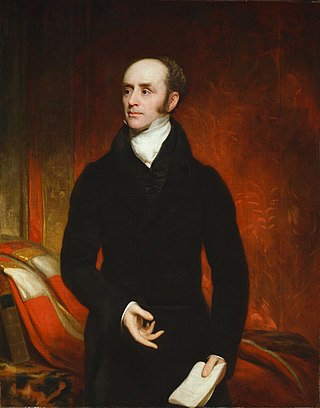
Charles Grey, 2nd Earl Grey, known as Viscount Howick between 1806 and 1807, was a British Whig politician who served as Prime Minister of the United Kingdom from 1830 to 1834. He was a descendant of the House of Grey and the namesake of Earl Grey tea. Grey was a long-time leader of multiple reform movements. During his time as prime minister, his government brought about two notable reforms. The Reform Act 1832 enacted parliamentary reform, greatly increasing the electorate of the House of Commons.

Edward Henry Stanley, 15th Earl of Derby, was a British statesman. He served as Secretary of State for Foreign Affairs twice, from 1866 to 1868 and from 1874 to 1878, and also twice as Colonial Secretary in 1858 and from 1882 to 1885.
The education system in Northern Ireland differs from elsewhere in the United Kingdom, but is similar to the Republic of Ireland in sharing in the development of the national school system and serving a similar society with a relatively rural population. A child's age on 1 July determines the point of entry into the relevant stage of education in the region, whereas the relevant date in England and Wales is 1 September.

Gathorne Gathorne-Hardy, 1st Earl of Cranbrook, was a prominent British statesman and Conservative politician. He held cabinet office in every Conservative government between 1858 and 1892, and was a key ally of Benjamin Disraeli.

Sir Thomas Wyse, an Irish politician and diplomat, belonged to a family claiming descent from a Devon squire, Andrew Wyse, who is said to have crossed over to Ireland during the reign of Henry II and obtained lands near Waterford, of which city thirty-three members of the family are said to have been mayors or other municipal officers: one, John Wyse, was Chief Baron of the Irish Exchequer in the 1490s.
Education in the Republic of Ireland is a primary, secondary and higher education. In recent years further education has grown immensely with 51% of working age adults having completed higher education by 2020. Growth in the economy since the 1960s has driven much of the change in the education system. For universities there are student service fees, which students are required to pay on registration, to cover examinations, insurance and registration costs.
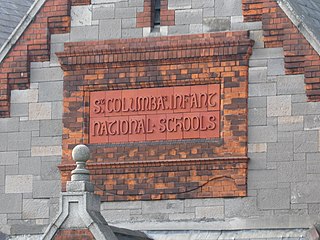
In Ireland, a national school is a type of primary school that is financed directly by the state, but typically administered jointly by the state, a patron body, and local representatives. In national schools, most major policies, such as the curriculum and teacher salaries and conditions, are managed by the state through the Department of Education. Minor policies of the school are managed by local people, sometimes directed by a member of the clergy, as representative of the patron, through a local 'board of management'. Most primary schools in Ireland fall into this category, which is a pre-independence concept.
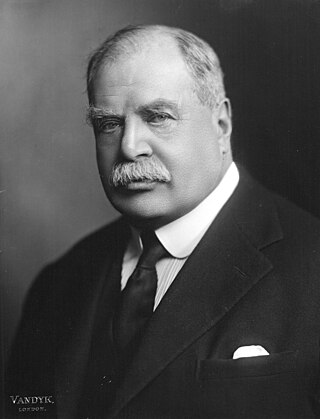
Edward George Villiers Stanley, 17th Earl of Derby,, styled Mr Edward Stanley until 1886, then The Hon Edward Stanley and then Lord Stanley from 1893 to 1908, was a British soldier, Conservative politician, diplomat, and racehorse owner. He was twice Secretary of State for War and also served as British Ambassador to France.

John MacHale was the Irish Roman Catholic Archbishop of Tuam, and Irish nationalist.
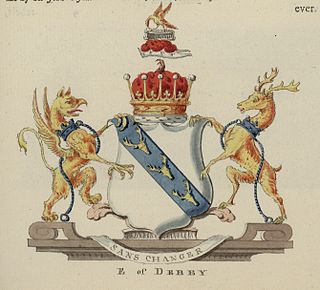
Edward Richard William Stanley, 19th Earl of Derby, is a British hereditary peer and landowner.
Events from the year 1852 in the United Kingdom.
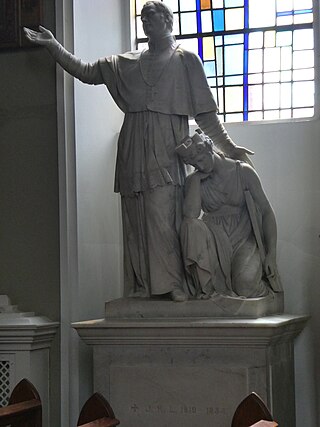
James Warren Doyle, OESA (1786–1834) was a Roman Catholic Bishop of Kildare and Leighlin in Ireland, who used the signature "JKL", an acronym from "James Kildare and Leighlin." Doyle was active in the Anti-Tithe movement. A campaigner for Catholic Emancipation until it was attained in 1829, he was also an educator, church organiser and the builder of Carlow cathedral.
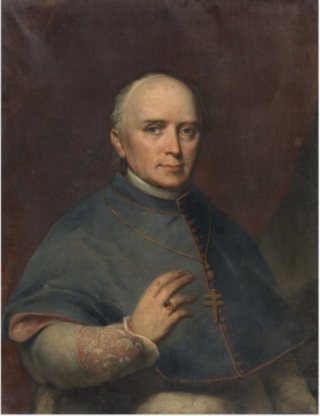
Daniel Murray was a Roman Catholic Archbishop of Dublin.

James Carlile (1784–1854) was a Scottish clergyman from Paisley. He was a joint minister of a Scots church in Dublin and an Irish commissioner of education. He introduced a different style of education in Ireland whereby children of different denominations could go to the same school.
Education in the Republic of Ireland is mostly denominational at primary and secondary level. That is to say, most schools are associated with a particular religion or Christian denomination. Denominational schools include most national schools at primary level, which types are publicly funded by the Department of Education. The school's patron or the chair of the board of management will often be a cleric or religious. The denomination influences the ethos, although in subjects other than religion a standard curriculum is prescribed by the Department of Education for all publicly funded schools. Denominational schools can give priority of admission to pupils of the given denomination with the exception of catholic schools but not refuse to admit pupils based on religion.
References
- ↑ Irish Educational Documents, vol. 1, Áine Hyland, Kenneth Milne, Church of Ireland College of Education, pp.98-103
- ↑ "North vs South: How the island's two education systems compare". Irish Times. Retrieved 11 December 2022.
- 1 2 Coolahan, John (1981). Irish Education: Its History and Structure. Dublin: Institute of Public Administration. p. 4. ISBN 0906980119.
- 1 2 Drudy, Sheelagh (2009). Education in Ireland: Challenge and Change. Dublin: Gill Books. ISBN 9780717155446.
- 1 2 3 4 McCormack, W. J. (21 January 2002). The Blackwell Companion to Modern Irish Culture. Wiley. p. 191. ISBN 9780631228172 – via Google Books.
- ↑ Bourke, Angela (2002). The Field Day Anthology of Irish Writing, Volume 5. New York: New York University Press. p. 648. ISBN 0814799078.
- ↑ O'Donovan, Patrick (1 September 2017). "Origin of our schools goes back to one letter". Irish Examiner . Retrieved 9 November 2021.